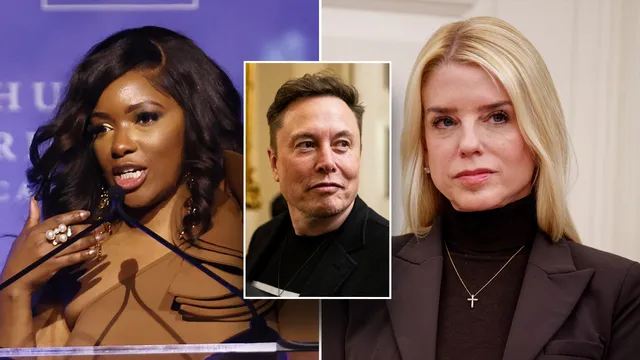
Pam Bondi issues warning to Jasmine Crockett over Musk remarks
2025-03-25 12:33- Jasmine Crockett sparked controversy with her comments about Elon Musk during a recent virtual rally.
- Pam Bondi responded by cautioning Crockett, declaring that the remarks could be dangerous and stressing protection for Tesla owners.
- This exchange highlights growing tensions in U.S. politics regarding corporate influence and response to protests.
Express your sentiment!
Insights
In the United States, tensions have escalated between Attorney General Pam Bondi and Representative Jasmine Crockett over controversial comments made by Crockett regarding Elon Musk. Bondi publicly addressed Crockett on Fox News, advising her to be careful after Crockett suggested that Musk should be 'taken down' during a rally held virtually to protest against his leadership. Bondi condemned these remarks and emphasized the importance of protecting Tesla owners, referring to the attacks on Tesla properties as domestic terrorism. She highlighted that recent incidents of violence have seen several individuals charged, potentially facing severe consequences. Crockett, in turn, defended her statements during an appearance on MSNBC. She clarified that her call to action was nonviolent and that she never promoted violence, whilst pointing out the necessity of addressing real violence and terrorism, especially concerning those involved in the January 6 Capitol riots. This exchange has sparked a broader debate that includes accusations of political violence from various Republican figures who have condemned Crockett's rhetoric. The ongoing protests against Musk and Tesla have grown more intense in response to his actions, including his criticisms of the federal government, which many believe have incited these demonstrations. As frustrations mount over Musk’s influence in politics and business, questions regarding safety and the potential extremist nature of such protests arise. Bondi’s firm stance reflects the urgency felt by some political leaders in the face of escalating incidents of violence linked to protests. While Bondi's warning to Crockett has drawn attention, host Alex Witt further challenged Crockett's stance, asking about her implications in a politically charged atmosphere. Republican leaders have weighed in, warning of imminent danger stemming from Crockett's remarks, suggesting a fear that her rhetoric could incite violent reactions among her constituents or followers. With protests aimed at Tesla anticipated to grow, major cities across the United States may soon see increased unrest tied to both Musk's actions and political tensions surrounding his leadership. The consequences of these exchanges and the response from their respective political bases will likely continue to evolve in the coming weeks.
Contexts
The intersection of corporate criticism and political protests has become an increasingly significant area of study in contemporary sociopolitical dynamics. Understanding how corporate entities influence and respond to social movements provides critical insights into the broader implications for democracy, corporate responsibility, and civic engagement. While corporations have historically maintained a distance from political activism, the advent of social media and global communication has compelled companies to confront public criticism more directly. This shift underscores how public perceptions and consumer sentiment have become critical elements in shaping corporate strategies and stances on social issues. When corporations engage in or respond to criticism, it can amplify or mitigate the impetus for political protests, impacting the effectiveness and visibility of these movements. Corporate criticism can arise from various sources, including grassroots activists, social media campaigns, and public opinion shifts. This criticism can catalyze protests, as marginalized groups leverage corporate power dynamics to highlight their grievances. By publicly challenging a corporation’s values or practices, activists can spotlight broader social issues, prompting collective action and community mobilization. Consequently, when corporations respond to this pressure—either through policy changes, public statements, or corporate social responsibility initiatives—they can play a transformative role in the political landscape. Their involvement can amplify protesters' messages, drawing greater attention to their causes and potentially swaying public opinion. However, the relationship between corporate responses and political protests is not without complexities. Corporations may choose to engage with or ignore public criticism based on various factors, including financial interests, consumer demographics, and potential backlash. Some corporations may adopt a cautious approach, avoiding overt political stances to mitigate alienation of any customer base. This reluctance to engage can foster disillusionment among activists, as the perceived silence or ineffectiveness of corporations undermines potential alliances. Moreover, the backlash faced by corporations that choose to take a stand can manifest in boycotts, negative publicity, or political ramifications, complicating the decision-making process regarding public engagement. The impact of corporate criticism on political protests illustrates the evolving landscape of activism in the context of corporate power. As social movements increasingly rely on corporate platforms and visibility to elevate their causes, the reciprocal influence between corporate policies and grassroots activism continues to shape the nature of public discourse. The consequences of this dynamic are significant, both for the efficacy of protests and for the role of corporations in societal change. Ultimately, the interplay between corporate criticism and political protests reveals the necessity for ongoing dialogue and strategic alliances among corporations, activists, and the communities they serve, highlighting the critical need for responsible corporate engagement in social and political issues.